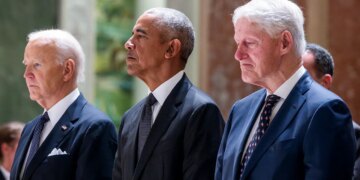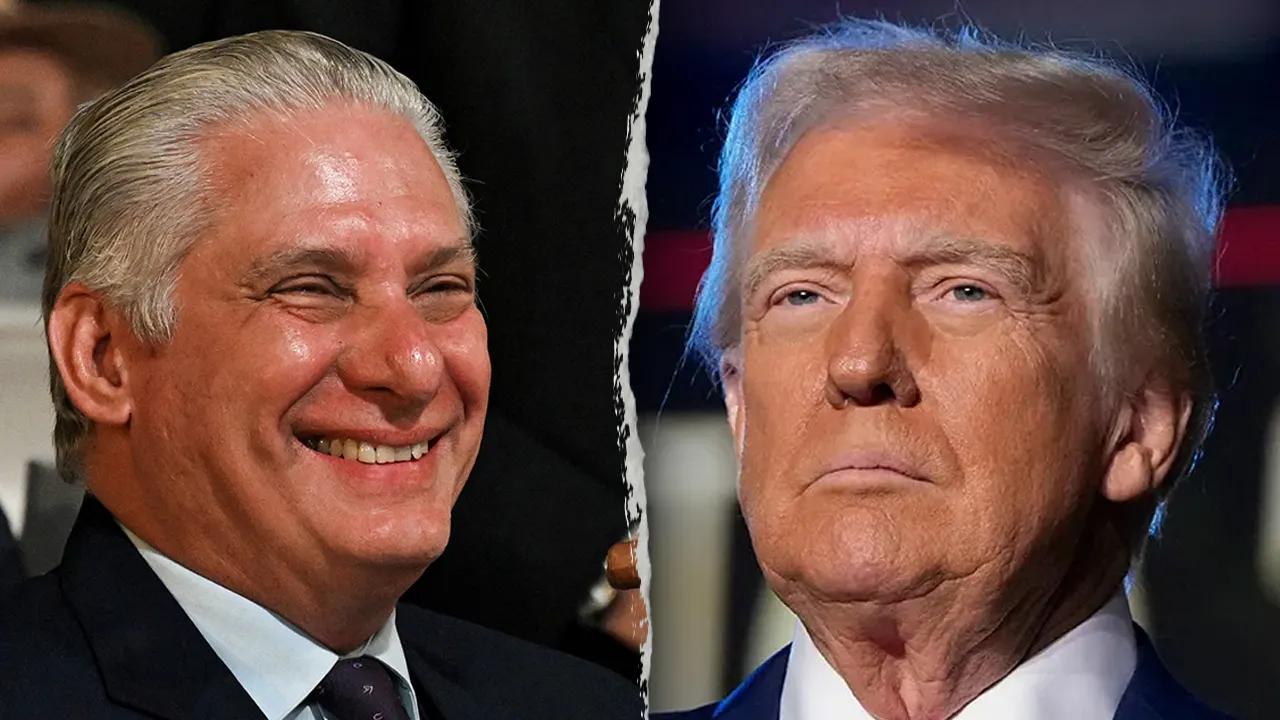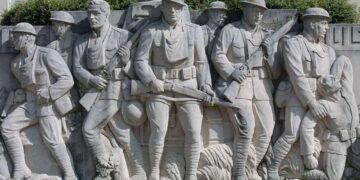Mutiny on his hands. [dramatic music] ♪ ♪ His response will be determined and drastic. >> “Unless effectual measures are taken to place the army upon a more satisfactory footing, its dissolution and the utter ruin of our cause will be the inevitable consequences.” –George Washington. >> Make ready. Aim!
>> Herrmann: The story of the mutiny began on January 1st in Morristown, New Jersey. There is little to celebrate this new year. The war has become an unrelenting misery. Soldiers from the Pennsylvania Line reach their limit. Unpaid, underfed, and barely clothed, they can endure no more for the Great Cause.
>> By 1781, the Continental Army has become, in many ways, the professional organization that Washington wanted and needed it to be. But it’s an army that is unhappy. They haven’t been paid in a long time, and when money has been forthcoming, it has been paper money that is depreciating moment by moment.
It’s worth less every day. The soldiers are quite clear about the fact that they are loyal to the cause, but they want the terms of their contract to be honored. >> Herrmann: Enraged, they voice their grievances to their superiors, but there is nothing to be done. Congress, without the right
To tax, is out of money to pay its soldiers. The soldiers are not swayed. >> They see this as a series of broken promises. They pledged their lives. They are spilling their blood. They thought they were making a contract to serve their country. But the country isn’t honoring the contract.
>> Herrmann: The officers watch from the comfort of their quarters. Some are sympathetic, but others brush the soldiers’ concerns aside. Suddenly, the ideas of the revolution, the talk of liberty and equality for all men, seem no longer to apply. >> I don’t think the fact that the officers had better clothing, better food,
Better equipment endeared them to the regular troops, who were so cold and so hungry and so behind in their pay. >> Herrmann: Within the revolution, a rebellion grows. On January 2nd, camps empty as 1,300 solders, one quarter of the Northern Army, up and leave. They march out, taking cannon and weapons, with one
Destination in mind: Continental Congress, a two-day march away in Philadelphia. Their plan: make Congress listen. >> They get as far as Princeton. They seize the town of Princeton. Washington sends an army to surround them there, and they negotiate a peaceful settlement. The troops who want to go home get their money.
The troops who want to stay get the clothing they need. About half of them go home, and that’s the end of it. >> Herrmann: Washington begs Congress for money and provisions as the only way to pacify his army. It is too little too late. >> “As I have used every
Endeavor in my power to avert the evil that has come upon us, so will I continue to exert every means to prevent an extension of the mischief, but I can neither foretell or be answerable for the issue.” –George Washington. >> Herrmann: Fresh unrest spreads among other camps. They, too, want what they
Believe they are owed. Now 200 soldiers from the New Jersey line rebel. They, too, begin their march to Congress. But this time, Washington will strike them down. For the sake of the revolution, these mutinies must end. >> He couldn’t have an army where mutinies took place and hundreds of men left
And went home. The army would implode, and the war would be lost. Worse, any mutiny leads the British to believe that the army is collapsing and to renew their fervor to win the war. Washington’s view is, “That’s it. Enough’s enough.” >> Herrmann: The mutineers don’t get far. All are quickly captured.
The ringleaders are sentenced to death by firing squad. But they are not the only ones who will pay a heavy price for their insubordination. >> In a cruel move, Washington then gets their 12 closest friends, 12 men who were with them in the mutiny but not quite the ringleaders,
And orders them to shoot them. The men in the Jersey line are aghast at this but, at the same time, terrified. “It could have been me.” >> “This was a most painful task. When ordered to load, some of them shed tears.” –James Thatcher, Continental doctor. >> Herrmann: The first six men fire. [gunfire]
But they have deliberately aimed high, sending a volley over the heads of the condemned men. [drum cadence] The second six are immediately assembled and, under penalty of death themselves, ordered to shoot. This time, the shots find their target. The punishment sends a clear message. Sedition will no longer be tolerated
In the Continental Army. >> After the execution of those men in that terrible winter of 1781, there were no more mutinies. >> Herrmann: But the unrest in his army has shaken Washington. His authority and the revolution are slipping away. He must find a way to end this war…now. >> Herrmann: In the South,
The war continues without pause, an ongoing showdown between two determined armies. Having surprisingly beaten the British at the battle of Cowpens, the Continentals steady themselves for revenge. The British will seek to make an all-or-nothing push to annihilate the rebel force. >> Fire! >> Herrmann: General Charles Cornwallis, the British commander in the South,
Has become singular in his obsession. He will not stop until he can make the Continental Army stand and fight. Instead, the rebels keep pulling Cornwallis deeper into the backcountry on a cat-and-mouse chase led by his archrival, General Nathanael Greene. >> Cornwallis himself believes that if he can draw Nathanael
Greene into one decisive fight, if he can bring this war to one pitched battle somewhere in the South, it’s all going to be over. Greene won’t give him that satisfaction. >> Herrmann: General Nathanael Greene knows better. He learned early on, in battles like New York and Brandywine, that keeping the army away
From direct confrontation is paramount. Like a boxer who realizes his opponent hits harder, Greene’s plan is to keep moving to wear down and exhaust his enemy. If he can buy time, he can get reinforcements. Greene draws Cornwallis, step by step, farther from his lines of supply, farther from the possibility of reinforcements,
Farther from the point of no return. Greene has been leading a chase for months that zigzags across the South. Through swamp and forest, Cornwallis manages to stay close, often trailing by a few hundred yards. But the Continentals are like a mirage that disappears as he draws near. The two sides regularly skirmish
Amongst scouting parties… but the main armies never meet. Greene’s Continental force is smaller, lighter, and faster. The British, by contrast, are encumbered. They will need to take extreme measures to keep up. To lighten his load, Cornwallis orders an enormous bonfire built onto which all the unnecessary trappings of a distinguished British army
Are thrown: wagons, tents, clothing, fine china, silver, and cask upon cask of rum. >> Cornwallis is very earnest. He does not want to allow Greene to escape. He is going to do anything within his power to catch up to Greene. >> “In this situation, without baggage, necessaries, with
Zeal and bayonets only, it was resolved to follow Greene’s army to the end of the world.” –Brigadier General Charles O’Hara. >> Herrmann: It is a fateful decision that he will pay for later. The race picks up speed. The two armies begin to travel at an almost inhuman pace,
Moving as much as 40 miles in a single day. Greene now sees only one chance for survival. As Cornwallis chases him toward the Virginia border, Greene makes a daring move. He splits his army, sending one branch toward the upper Dan River while the main army moves east, where Greene has
Commandeered all the boats along the crossings. Cornwallis, fooled, dutifully follows the decoy. >> It bought Greene the time he needed to move down the river to the point where the Continentals had gathered all of the boats on that river and crossed at a point that Cornwallis could not hope to cross.
>> Herrmann: Greene’s plan works. He moves his entire regiment, all 2,000 men, across the Dan, reaching the other side just in time. The British, realizing the ploy, rush to the crossing, arriving just hours after the last of Greene’s boats leave. Cornwallis, so close to the victory he sought, recognizes that the chase
Is over. >> Huzzah! Huzzah! >> Herrmann: The cheers from the Continentals are so loud, they can be heard across the river, a taunting sound to the British. But it is genuine joy. After marching more than 200 miles in just one month, Greene’s army can finally rest. Greene will not stay in Virginia long.
He will get what he needs– new supplies and new recruits– and change his game. The hunted will become the hunter. Here in the South and beyond, the tide is about to turn. >> Herrmann: Far from the swamps of the Southern colonies, another chase drags on. The court of Versailles. The venerable diplomat
Benjamin Franklin is still in hot pursuit of France’s money. Lately, it has become elusive. King Louis XVI, America’s ally against the British, has given more than $100 million in direct aid to the revolution. In fact, he’s going broke funding the Americans. Yet it never seems to be enough to satisfy Ben Franklin.
>> Franklin gets these truly amazing shopping lists from Congress. They are requisition lists for everything from thimbles and shovels and thread and drums and paint brushes too. Oh, and, by the way, 30,000 blankets and 50,000 uniforms. And a ship of the line would be nice too. Franklin is essentially constantly approaching them
With his tin cup and being told, “But we already gave at the office,” you know, being told, “We’ve already given you X. How can we possibly cough up more?” >> Herrmann: Franklin is caught between two masters. On one hand, he must convince the French that the American Revolution can still be won.
On the other, he must assure Congress that French aid, the key to the war, is on its way. Some Americans, like General Washington, have reason to doubt it. >> Washington was always confused and perplexed and, until the end, disappointed in the French. The soldiers that they did promise didn’t get here fast enough.
He didn’t feel that there were enough of them. He’s worried about the help that the French have given him, if it’s going to be in time. >> Herrmann: Unbeknownst to Washington, his concerns are being answered. Quietly, on its own schedule and with its own agenda, the French navy finally makes
A move that will change the war. On the eastern coast of France, a shipment is being prepared. The mighty French warship the Ville de Paris readies for a long voyage to the Americas. At its helm, the Admiral Francois-Joseph-Paul, Comte de Grasse, one of France’s most talented admirals and greatest glory seekers.
De Grasse’s stated mission is in the Caribbean, where France’s critical trading interests lie. But if the timing is right, de Grasse plans to visit North America. After all, this is a war against the British, a cause beloved by all French. >> It’s important to remember that France is in this conflict
Not to secure American independence. France is in this conflict to humiliate the British government, to hopefully seize some territory from Britain, and to slice off a major part of the North American empire from the British empire. >> Herrmann: America may be a pawn in this game between superpowers, but the rebels
Can still make their own luck. Their next moves will shape fresh opportunities for all sides. General Nathanael Greene pushes his players into position. He readies his army, now regrouped and resupplied, to cross back into North Carolina, where he will now seek the confrontation with Cornwallis he once avoided. Crossing again over the
Dan River, Greene soon draws Cornwallis back into the chase, only this time, Greene leads the desperate British commander toward a spot favorable to the Continentals. They will take the high ground at a small junction called Guilford Courthouse. Greene sets his army first. >> Fire! [gunfire] Cornwallis, weakened from lack of provisions, nonetheless
Prepares to throw all he has left at winning. Cornwallis’ men soon break through Greene’s militia lines. They bear down on the rest of the army with bayonets. [men yelling] The Continentals face the charge. The two sides fall upon each other at close quarters, a bloody melee fought hand-to-hand. Fearing loss, Cornwallis makes
A desperate and brutal decision. >> Cornwallis turns to the lieutenant in charge of artillery and orders him to fire grape right into the mass of struggling men, both Americans and British, in order to break it up. >> Herrmann: The cannon cut down as many British as Americans, but it is enough
To stop the rebels. Greene orders his men to retreat. He cannot and will not risk his soldiers. Cornwallis is victorious but only by sacrificing his own men. Twice as many British die in the victory as Continentals perish in the loss. It is the kind of win that feels, ultimately, more like a defeat.
The months spent chasing Greene have cost Cornwallis greatly and gained him nothing. Defeat of the rebel army is not one inch closer to him. He will leave the Carolinas an ambiguous victor in search of more decisive battles. But he leaves the British strategy in tatters just at the moment the Continentals
And their French allies are about to move as one. >> Herrmann: Losses in the South and stalemate in the North have left the British command in America in disarray. Worse, public confidence back home is weakening. All of Britain is tiring of this increasingly unpopular conflagration whose costs in money and human life continue
To escalate. King George and his cabinet may try to spin it differently, but they cannot change the facts; the insurgent colonies are showing no signs of submission. >> The British people are saying, “Come on home. What’s in this for us?” They’re wondering, “How is this going to end?
How is this going to play out? Or is this just going to go on forever?” >> Herrmann: The rift between those who wish to end the war fast and those who take the long view travels over the Atlantic. In America, the king’s commanders will soon find themselves with opposing strategies of war.
In New York, Sir Henry Clinton, the overall British commander, takes a patient view of things. It’s easy for him, surrounded as he is by all the luxuries the colonies have to offer. >> Clinton has four houses that he lives in in New York. He’s living pretty high on the hog, well supplied.
Certainly, his liquor bill is remarkably high. He found great enjoyment in the arms of Mrs. Baddeley, who was the wife of a British officer. I would guess it was hard for Clinton to leave New York. It was comfortable. It was loving. At least Mrs. Baddeley was. >> The way Clinton conducts the
War from New York, it’s almost like he’s waiting for events to throw him an advantage that he can then act upon. Cornwallis’ instincts are to act. Cornwallis’ instincts are to fight them to the death. >> “Now, my dear friend, what is our plan? Without one, we cannot succeed.
If we mean an offensive war in America, we must abandon New York and bring our whole force into Virginia.” –General Charles Cornwallis. >> Herrmann: Cornwallis pushes his contest into Virginia, but he is soon cut short. Clinton, opting for defensive wars, orders him to set up a protective base along the coast.
>> “This adventure through the South, inland, is not working. We need to make sure that we secure the kinds of bases, the footholds that will allow us to maintain our position in North America and fight another day.” >> Herrmann: Cornwallis has no choice but to obey his commander. He turns his army toward
A small coastal village, to a place called Yorktown. Once Yorktown was known solely as a tobacco trading port, but it will soon become a major battlefield and, for some, a place of destiny. France’s Admiral de Grasse makes his long-awaited appearance. >> The fall is hurricane season in the Americas.
This is the time when, for the most part, shipping comes to a complete pause in the Caribbean. And so it’s the right moment for de Grasse to leave the Caribbean and assist their allies in North America. >> “I am sorry to see the distress in which the American continent finds itself.
You can note the desire I have to provoke a change in your favor of the situation.” –Admiral de Grasse. >> Herrmann: The French navy, thus far an absent player in the revolution, now turns north with 28 ships, 3,000 men, and long-awaited money to pay Continental soldiers. But they also come with
A catch: It will be the French, not Washington, who decide where they will land. In their view, the British are weakest in Virginia, near the Chesapeake Bay, at the small port of Yorktown. >> Washington had his heart set on retaking New York. But when de Grasse says he’s going to the Chesapeake,
He’s going to be there just for a certain time, Washington then makes really the greatest decision of his career. He knows–he seems to sense– that this is the time. This is the time to strike. >> “It may be declared in a word that we are at the end
Of our tether and that now or never, our deliverance must come.” –George Washington. >> Herrmann: With all he has– every soldier, every cannon, every French reinforcement– Washington moves south. The general now returns to Virginia, his beloved homeland, in search of the battle he hopes will end the war. Washington breaks his stride
Just once, as he rides ahead of his army on a mission of a more personal nature. For the first time since the beginning of the revolution, Washington visits his home. >> He goes home to Mount Vernon, and I think the whole point of the war is brought home again to him
On a very personal level. >> Herrmann: He had seen Martha only rarely, and he had grown out of touch with Mount Vernon. Now he delves into the details that a man of the house, not the general of an army, would attend to. There is the ongoing renovation of Mount Vernon
And the particulars of running a Southern plantation. Six years ago, he left them behind to take charge of a rebellion that turned into a revolution and a revolution that turned into a world war. Now he longs for it to be over. >> “This is what I’m fighting for,” on one hand.
And then on the other hand, it’s, “When can I get home? I’m fighting for this, but I want to be here so much.” >> Herrmann: George Washington is not the only one who came into his own in these many years. Washington’s only son, Jacky, had come of age too.
Long kept out of the army by his overprotective parents, Jacky now makes a final plea to follow his father into battle. This time, Washington softens. It is a testament to Washington’s confidence. With all good fortune, the end of the war is at hand. A convergence is taking shape.
As Admiral de Grasse sails up toward Virginia from the Caribbean, the Continental Army, now joined by 5,000 French troops, also heads toward the Chesapeake Bay. There, General Cornwallis hastens to build his defenses at Yorktown. But he is beginning to feel that he is sitting at the center of a dangerous trap.
Cornwallis raises the alarm. He writes to Clinton in New York. >> “Sir, if I had no hopes of relief, I would rather risk an action than defend my half-finished defenses. But if you cannot relieve me very soon, you must be prepared to hear the worst.” –General Charles Cornwallis. >> Herrmann: Clinton’s
Response: vague promises. >> “Your Lordship may be assured I shall endeavor to reinforce the army under your command by all the means within my power.” –Sir Henry Clinton. >> Herrmann: Cornwallis will soon find himself hanging on those promises, while Washington and the French will get their chance to fulfill the promise of alliance.
For each player, the war’s endgame has arrived. >> Herrmann: The Continental Army, after a year of deadlock and disloyalty, is now moving as one en route to Yorktown and the largest offensive of the war. America, fatigued after six years of fighting, holds its breath. Independence, their glorious cause, feels within its grasp
Once more. Admiral de Grasse and his French fleet arrive first to the Chesapeake Bay and take on the inadequate British force sent to chase him out. The two navies clash at sea for four days. Both fleets are badly hurt, but it is the British who must give up the bay.
>> They needed to drive de Grasse out of the mouth of the Chesapeake, and that they failed to do. >> Herrmann: De Grasse, in one pivotal battle, captures control of all that comes in to or out of Yorktown. General Cornwallis knows his situation is worsening. He needs more help. He needs reinforcements.
His commander, Henry Clinton, has not budged from New York. >> “Sir Henry Clinton to Earl Cornwallis, New York. Your lordship may be assured that I am doing everything in my power to relieve you, if the winds permit and no unforeseen accident happen. This, however, is subject to disappointment.” –Sir Henry Clinton.
>> “Earl Cornwallis to Sir Henry Clinton. Sir, I shall have no doubt if relief arrives in any reasonable time, York will be in the possession of His Majesty’s troops.” –General Charles Cornwallis. >> Herrmann: Cornwallis, feeling magnanimous, takes faith in Clinton’s tepid promises. Imprudently, he stays put. One by one, his routes
Of escape are cut off. De Grasse’s ships inch up the York River. George Washington takes the south. French ground troops occupy the north and west. 17,000 French and Continental soldiers now surround Cornwallis. Washington presents his plan: launch a massive frontal assault on Cornwallis. His European allies disagree. >> Yorktown has now become
Heavily fortified. Washington will lose a lot of men in the assault. General Rochambeau, the French commander, suggests a long-range siege of cannon and water. Washington sees it as a better strategy. One of his great gifts as a commander was to listen to other people and often do what other people suggested, even if
He was against it at first. >> Herrmann: On October 6th, the siege begins. Trenches are dug that will, in time, envelop Yorktown like the tightening of a noose. >> “Earl Cornwallis to Sir Henry Clinton. Sir, the enemy made their first parallel on the night of the 6th. On the evening of the 9th,
Their batteries opened and have since continued firing without intermission. Against so powerful an attack, we cannot hope to make a very long resistance.” –General Charles Cornwallis. >> A lot of a siege is about the timing. Can you force a city to surrender before the city gets reinforcements? Can you get closer and closer
In your parallel trenches as you move towards the city’s line of defenses? >> Herrmann: October 11th, the second parallel is dug, closing the circle around Yorktown. Still, there is no sign of Clinton’s reinforcements. >> “October 11th, 5:00 p.m. Since my last letter was written, we have lost 30 men.
I have only to repeat, nothing but a direct move can save me.” –General Charles Cornwallis. >> Clinton promises support, and Clinton promises support, and Clinton promises support. And Cornwallis waits for the support, and he waits for the support, and it doesn’t arrive. >> “The siege daily is becoming more and more formidable.
His Lordship Cornwallis must view his situation as extremely critical, if not desperate.” –James Thatcher, American officer. >> Herrmann: October 14th, 8:00 p.m. Washington’s troops close in and make a full-scale attack on the outer redoubts of the fort. >> “October 15th. Earl Cornwallis to Sir Henry Clinton. Sir, my situation now becomes very critical.
The safety of this place is so precarious that I cannot recommend you run great risk in endeavoring to save us.” –General Charles Cornwallis. >> Herrmann: Cornwallis’ letter will not be read. Clinton has already set sail from New York. But the belated relief effort will not be in time. His window has closed.
For six long years, Washington fought a war marked more by loss than victory. Now his day has come. The general’s finest hour begins quietly with a lone British drummer spotted coming through the smoke. >> “The enemy beat a parley, and Lord Cornwallis proposed a cessation of hostilities to settle terms for the surrender
Of the posts. To this, he was answered that a desire to spare the further effusion of blood would readily incline me to accept of the surrender but that I wished to have it in writing.” –George Washington. >> When he got Cornwallis’ letter proposing the cessation of hostilities, his heart must
Have been ready to burst, because I think he must have known just as Cornwallis knew that was it. This was the end. >> “To Sir Henry Clinton. Sir, I have the mortification to inform Your Excellency that I have been forced to surrender the troops under my command. I never saw this post
In a very favorable light.” –General Charles Cornwallis. >> Herrmann: General Henry Clinton can barely contemplate the consequences of his inaction. He had set in motion the endgame and then sat idly while it played out. Now the Southern British army is lost and possibly the war itself. 7,000 redcoats lay down
Their arms in front of General George Washington. On this momentous occasion, only one person is missing. General Charles Cornwallis avoids the ceremony, claiming illness. No doubt he felt worse on this day than any other in his long military career. >> How could this have happened? Cornwallis is so humiliated and
So stricken by the defeat that he cannot surrender in person to George Washington. >> Herrmann: Cornwallis and Washington will meet a week later, when Cornwallis, in a show of respect, invites Washington to his headquarters. What the two men discuss is not recorded, but surely they must have shared the same thought.
Now they come together as equals, as the commanders from two nations–one ancient and powerful, the other on the verge of being born. >> For the Americans, certainly there are euphoric feelings of victory. Now, though, the more difficult task of building a nation begins. >> Herrmann: Washington the general is about to exit
The stage to make way for Washington the statesman and nation-builder, a challenge he cannot yet conceive. But before he can look to the future, Washington is pulled back into the present. Victory has come at a terrible price, a personal tragedy that will forever scar the general. During the siege, Washington’s son, Jacky,
Who finally came to fight alongside his father, falls ill to a devastating camp fever. Washington and Martha arrive in time to see their son alive but only briefly. Jacky soon dies, at the very last a victim of America’s crusade at Yorktown. >> The same time the country is celebrating in jubilation
Through all the colonies at the victory of Yorktown, the commander in chief who brought them that victory is mourning, deep in grief over the death of his son and his final child. George and Martha have now lost all their children. >> Herrmann: It is the final, ultimate sacrifice for the
Virginia farmer who stepped up to lead his fledgling country. At last, it seems the revolution is coming to an end. But Washington, like the thousands of Americans who fought and died alongside him, must wonder at the extraordinary cost of independence.

































 Reaction & Commentary
Reaction & Commentary














